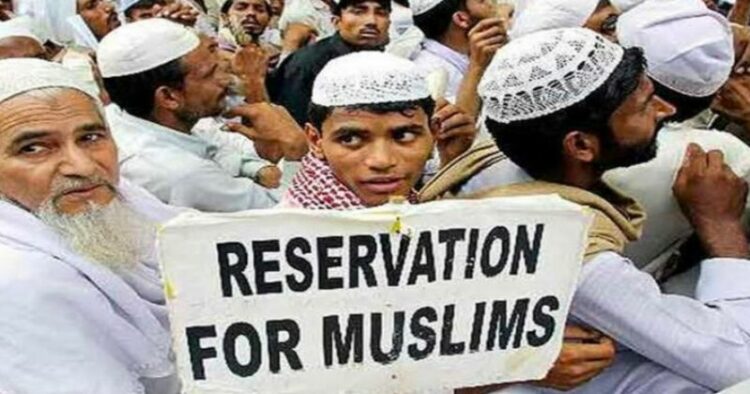The BJP-led Karnataka Government has submitted an affidavit, defending its decision to scrap the almost three-decade-old four percent reservation provided to Muslims in the ‘Other Backward Classes’ (OBC) category, to the Supreme Court stating that reservation solely based on religion is unconstitutional since not only it violates Articles 14, 15 and 16 of the Constitution of India, but also militates against the principles of social justice and secularism.
The affidavit reads, “The aim of reservation, as envisaged in the Constitution, is to promote social justice by providing affirmative action to those who have historically been marginalized and discriminated against in society. The same has been enshrined in Articles 14 to 16 of the Constitution of India…The backward classes have been referred to as a “collection of certain castes” by none less than Dr BR Ambedkar. The whole point being there were socially and educationally backward classes in society who have been historically deprived and discriminated against. The same cannot be equated with an entire religion.”
Supreme Court is hearing a plea challenging the Karnataka Government’s decision to scrape off the 4 percent reservation provided to Muslims under the OBC category. The government redistributed the freed up seats amongst Veerashaiva-Lingayats and Vokkaligas communities equally, after scraping off the Muslim reservation.
The affidavit states that while the ‘conscious’ decision was taken to discontinue reservations for the entire Muslim community, the backward classes such as Pinjaras, Ladafs, and Mansooris, can continue to enjoy the benefits of reservation under the old regime.
Furthermore, the affidavit also states that the initial inclusions of Muslims for reservation under the OBC category in 1979 was contrary to the recommendations of the first state backward class commission constituted by then Chief Minister D Devaraj Urs in 1972 and headed by LG Havanur. The affidavit also submitted, “The Mandal Commission clearly found that religion could not be the sole basis for reservation,” placing reliance on the Mandal Commission’s report.
“The rationale behind the aforesaid report is that the entire religion or religious communities cannot be treated as a monolithic entity for the purposes of reservation. As such, there is no reservation given to the Muslim community on the basis of religion as a whole in the central list. Even throughout the country, except State of Kerala, there is no state that provides for reservation for the Muslim community as a whole. There are various communities from the Muslim religion that are included in the SEBC which also continues to be the case in Karnataka. As such, the same in itself shows that the reservation solely on the basis of religion is not the practice followed anywhere in the country except Kerala and in the State of Karnataka, till recently,” the affidavit said.
The Karnataka Government has contended that granting reservation to the entire Muslim community is violative of Article 14 as such classification is arbitrary, unreasonable and has no rational basis. “Even otherwise, it would lead to further deprivations of the backward classes or groups within the Muslim community as the forward classes or groups would be in a position to garner the benefits under the policy,” the affidavit reads. Furthermore, it argued that as per Articles 15 & 16, it was duty-bound to not discriminate on the basis of religion.
“The concept of social justice aims to protect those who are deprived and discriminated against within the society. Including within the said ambit an entire religion would be an antithesis to the concept of social justice and the ethos of the Constitution. Furthermore, the Preamble itself states that India is secular, which has been understood as “a positive concept of equal treatment of all religions”. Viewed thus, reservation on the basis of a person belonging to a particular religion militates against secularism and is, therefore, unconstitutional,” the affidavit reads.
“The petitioners have sought to give a colour to the exercise in question which is completely baseless. The timing of the decision, etc are immaterial without the petitioners clearly demonstrating that the reservation on the basis of religion is constitutional and permissible. Merely because reservations have been provided in the past on the basis of religion, the same is no ground for continuing the same for perpetuity, more so when the same is on the basis of an unconstitutional principle,” the affidavit added.
Karnataka Government Scraps Quota on Religious Ground
On March 26, Union Home Minister Amit Shah endorsed the decision of the Karnataka Government and asserted in unambiguous words that there is no provision in the Constitution to provide reservations on the basis of religion.
While addressing a rally in poll-bound Karnataka’s Bidar, the Home Minister slammed the Congress for providing reservations on the basis of religion. He said that the reservation for Muslims introduced by the previous Congress-led Government was not as per Constitution.
“Congress Government due to its polarisation politics provided reservation to the minority. Reservations provided to the minority were not as per Constitution. There is no provision in the Constitution to provide reservation on the basis of religion,” the Home Minister said.
In its last Cabinet meeting before the polls, the Basavaraj Bommai Government on March 24 scrapped the four per cent OBC reservation for Muslims and distributed it to two communities – Veerashaiva-Lingayats and Vokkaligas.
The Cabinet decided to move OBC Muslims to the 10 per cent Economically Weaker Section (EWS) category. Amit Shah maintained that the Congress party had provided reservation to the minority as part of its polarisation politics. “The BJP scrapped that reservation and provided reservations to Vokkaliga and Lingayat communities,” he said.




















Comments